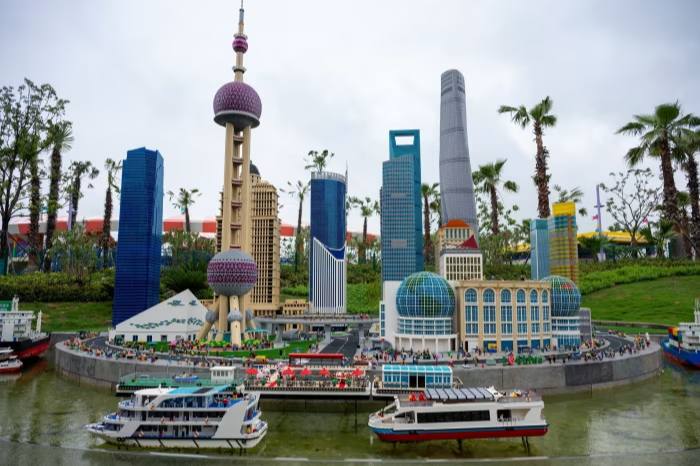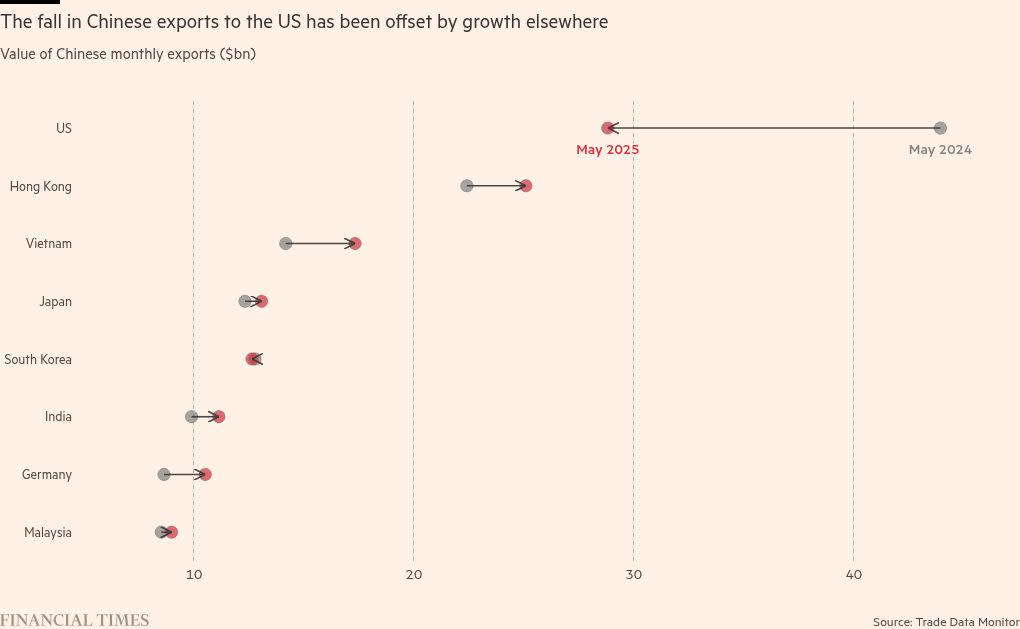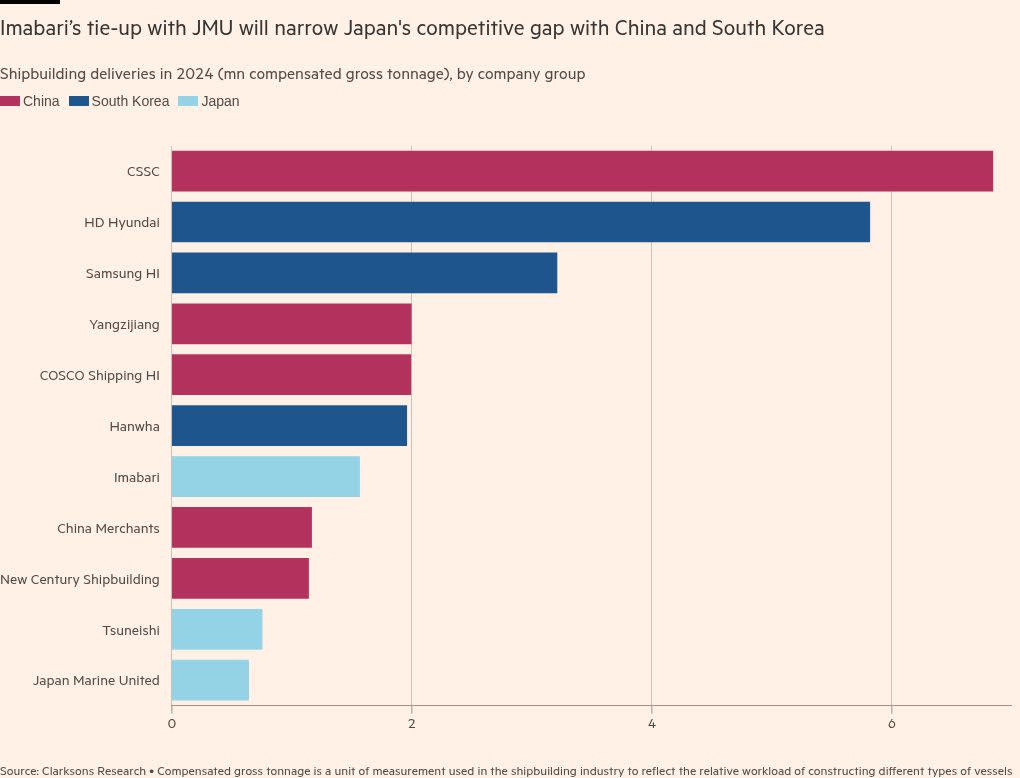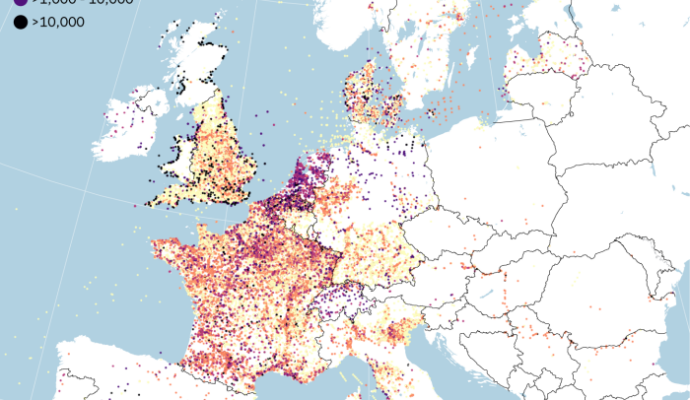This article is an on-site version of our FirstFT newsletter. Subscribers can sign up to our Asia, Europe/Africa or Americas edition to get the newsletter delivered every weekday morning. Explore all of our newsletters here
Good morning and welcome back to FirstFT Asia. On today’s agenda:
China reroutes exports via south-east Asia
Tony Blair’s staff participated in ‘Gaza Riviera’ project
How doing business in Hong Kong is changing
We start with new data suggesting that Chinese businesses are sending increasing volumes of goods to the US via south-east Asia in a bid to evade Donald Trump’s tariffs. Here’s what to know.
What the data shows: The value of Chinese exports to the US dropped by 43 per cent year on year in May, according to figures published by the US census bureau — equivalent to $15bn-worth of goods. But the country’s overall exports rose by 4.8 per cent in the same period, official Chinese data showed, as the shortfall in trade with the US was offset by a 15 per cent increase in shipping to the Association of Southeast Asian Nations trade bloc and a 12 per cent rise to the EU.
The data showed “a really striking pattern”, said Mark Williams, chief Asia economist at consultancy Capital Economics. “We saw this during the first US-China trade war. There was a fairly immediate shift. US imports from China dropped off, but they picked up from Vietnam and Mexico,” he said.
Trans-shipping crackdown: Last week Washington struck a trade deal with Vietnam that includes a 40 per cent levy on goods that are trans-shipped through the country, in a move that was widely thought to be targeting Chinese re-exports to the US. Many countries have not yet reached trade deals with Washington. The pause on Trump’s “reciprocal” tariffs ends on Wednesday, and any future deals could also include additional trans-shipment levies.
Here’s what else I’m keeping tabs on today:
Economic data: Thailand publishes inflation figures for June.
Brics summit: The gathering of the group of developing countries continues in Rio de Janeiro, Brazil. The absence of Chinese leader Xi Jinping has thrown a question mark over the meeting.
Trump-Netanyahu meeting: The Israeli leader meets with the US president to discuss a potential ceasefire with Hamas.
Five more top stories
1. The Tony Blair Institute participated in a project to develop a postwar Gaza plan that envisaged kick-starting the enclave’s economy with a “Trump Riviera” and an “Elon Musk Smart Manufacturing Zone”. The plan outlined in a slide deck, seen by the FT, was led by Israeli businessmen and used financial models developed inside Boston Consulting Group to reimagine Gaza as a thriving trading hub.
2. Chinese mining acquisitions overseas have hit their highest level in more than a decade as companies race to secure the raw materials that underpin the global economy. Experts said that Chinese groups are “trying to get a lot of M&A done before geopolitics get difficult”. Here’s more on China’s mining rush.
3. The crew of a Greek-owned cargo ship was forced to abandon the vessel in the Red Sea yesterday after the first suspected attack by Yemen’s Houthis this year on a commercial vessel. The chief executive of Greece’s Stem Shipping, which owns the vessel, told the FT the crew had been left “terrified” by the multiple waves of attacks, which started with an assault by men in skiffs and left the ship taking on water. Read the full story.
4. Elon Musk said he had formed a new political party to fight the “one-party system” afflicting the US, after falling out with Trump over the president’s landmark domestic policy bill. The billionaire suggested that the party would initially target key congressional races.
5. The search for 11 girls missing from a summer camp in Texas continued for a third day as the death toll from flash flooding climbed to almost 70 people, including 21 children. The Guadalupe River that runs through the Hill Country in central south Texas rose by eight metres in 45 minutes in the early hours of Friday, according to officials, bursting its banks and destroying roads and property.
FT Magazine
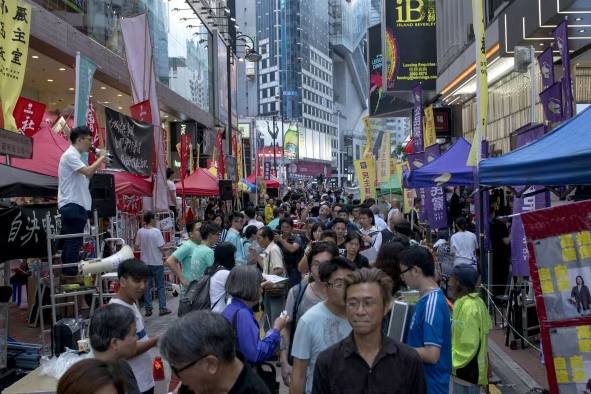
Can Hong Kong reprise its role as a global financial hub? The Chinese territory has a lot to bounce back from: enormous pro-democracy protests in 2019 and 2020; a tough new national security law imposed by Beijing; then there were its strict Covid-19 policies. Fresh off a two-year posting in Hong Kong, the FT’s Kaye Wiggins explores how doing business in the city is changing.
We’re also reading . . .
‘Dragon-Bear’ embrace: The China-Russia partnership seeks to build a new world order. But is this bond as close as it seems?
Biohacking: FT Magazine goes inside a “neurohacking” camp that promises 40 years spiritual enlightenment in five days.
Vulnerable leaders: Admissions of overwhelm show humanity, writes Pilita Clark — if people in charge are strategic with their weaknesses.
Chart of the day
Japan is mounting its most ambitious push in decades to revitalise its shipbuilding industry — and compete against China’s dominance of the sector — through consolidation and a proposed $7bn national fund.
Take a break from the news
China’s first Legoland, one of the world’s biggest, officially opened in Shanghai on Saturday. Among the attractions to lure visitors: a Lego reconstruction of the Great Wall and replica of the city’s distinctive skyline.
